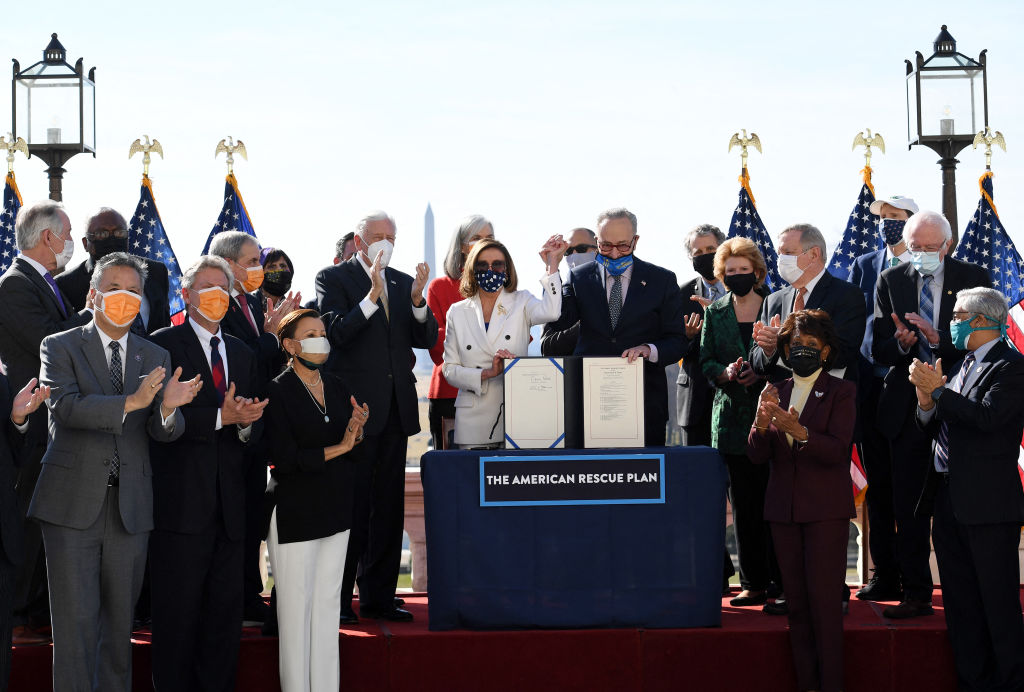
I am the first-generation daughter of Italian immigrants. My mother worked behind a sewing machine in the sweatshops of New Haven, Connecticut. My dad sold insurance. Both my parents made the work of their lives helping other immigrants and helping ease their struggles—with an unfamiliar language, jobs, housing. We struggled, too. I was a girl when my family was evicted, all our belongings on the street. We moved in with my grandmother. At our kitchen table, I learned about the importance of raising your voice for change, and working for the middle class and all those struggling to get by and get ahead. And I learned never to give up.
Important lessons for anyone, but especially for me and especially as a Member of Congress in this moment. Eighteen years —almost to the day—after I first introduced the expanded Child Tax Credit, both the Senate and the House have passed it as part of President Biden’s COVID relief package. The legislation expands and improves the tax credit for children, increasing the size of the credit and making it refundable. That means if you are so poor you do not owe taxes—and could never get any child tax credit because you did not have any tax bill against which to subtract a credit—you now get the tax credit in cash, monthly. Poor, working, and middle class families—90 percent of all kids—will all get the same monthly payments, unless their parents opt for annual benefits.
We are also Increasing the value of the existing tax credit which helps all these families become more secure and face expenses and taxes that build up raising a family. Poor, working, and middle class families would receive $300 per-month, per-child ($3,600/year) for children under six years of age and $250 per-month, per-child ($3,000/year) for children between the ages of six and 17. For these families, the child benefit is increased to $3,600 or $3,000 (depending on the age of the child) from what is now a $2,000 credit for all children, except those in the wealthiest families. No new bureaucracy. No need to stand-up a new agency. Studies show it can cut child poverty in half.
So what took so long? It wasn’t outright opposition that stopped the bill. Sometimes it was indifference to doing something for children. There were years Democrats didn’t even want to talk about poor children. It was hard to get people’s attention, to really get people to understand what this could mean to invest in all children and to really understand that we could help millions of children and their families out of poverty. But I wasn’t giving up. My parents would never have accepted “no” for an answer.
And here’s the thing about Congress: one remarkable part of the institution is that you can lose and go back and fight another day. My first job in Congress was as Chief of Staff to then-Senator Chris Dodd. It took him eight years to win passage of his Family Medical Leave Act and watch President Bill Clinton sign it into law. I was there at the start, as staff, and a Member of Congress voting for it at the end. The fact is, times change, opportunities change, circumstances change, and you find a moment when you can do something you couldn’t—even for 18 years.
We are at a moment where passage became possible. The coronavirus pandemic did not just shine a light on child poverty, it exacerbated it, and amplified the need—and the urgency—for expanding and improving the tax credit. Across America—the richest nation on the planet—more than 11.9 million children struggle against poverty, and the youngest children are the poorest, the Children’s Defense Fund reported in 2018. The economic devastation that’s come with the COVID-19 pandemic has deepened the crisis. An earthquake of unemployment and illness is shaking the foundations of an ever-growing number of families, working families and middle-class families too, pushing more into poverty and tougher economic struggles than ever before. We can help them all.
In this moment of grave need, we also have Presidential leadership and strength in Congress. But the Biden relief package expands and increases the child tax credit for only one year. Now must also be the moment to make permanent changes that would lift generations of children out of poverty and help working and middle-class families more hard-pressed than ever. Studies show we could cut Black child poverty by 52.4%, cut Hispanic child poverty by 45.4%, and cut Native American child poverty by 61.5%. One year of a refundable tax credit—particularly while the economic ground is still shaky—falls far short of providing a stable foundation for the future.
It was 86 years ago that President Franklin D. Roosevelt signed the Social Security Act so that our oldest citizens in retirement would have the promise of some security and a bulwark against poverty. We owe our youngest the same promise and protection. Just as FDR faced a moment ripe for bold action and big change, so do we, and this is the moment.
More Must-Reads from TIME
- How Donald Trump Won
- The Best Inventions of 2024
- Why Sleep Is the Key to Living Longer
- Robert Zemeckis Just Wants to Move You
- How to Break 8 Toxic Communication Habits
- Nicola Coughlan Bet on Herself—And Won
- Why Vinegar Is So Good for You
- Meet TIME's Newest Class of Next Generation Leaders
Contact us at letters@time.com